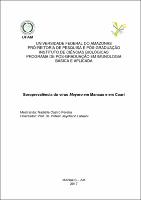| ???jsp.display-item.social.title??? |


|
Please use this identifier to cite or link to this item:
https://tede.ufam.edu.br/handle/tede/7100| ???metadata.dc.type???: | Dissertação |
| Title: | Soroprevalência do vírus Mayaro em Manaus e em Coari |
| Other Titles: | Soroprevalence of the Mayaro virus in Manaus and Coari |
| ???metadata.dc.creator???: | Pereira, Nadielle Castro  |
| ???metadata.dc.contributor.advisor1???: | Lalwani, Pritesh Jaychand |
| ???metadata.dc.contributor.referee1???: | Passos, Fernando de Souza |
| ???metadata.dc.contributor.referee2???: | Bastos, Michele de Souza |
| ???metadata.dc.description.resumo???: | O vírus Mayaro (MAYV) é um arbovírus que pertence à família Togaviridae, gênero Alfavírus, considerado emergente da Floresta Amazônica. É transmitido pelo mosquito Haemagogus janthinomys e causa a febre Mayaro, uma doença infecciosa febril aguda, cujos principais sintomas são: febre ˃38oC com duração de 4 a 5 dias, dor de cabeça, erupções cutâneas, mialgia e artralgia; em alguns indivíduos, a artralgia pode persistir por pelo menos seis meses ou mais, apresentando sintomas semelhantes à artrite. O objetivo deste estudo é descrever a soroprevalência do MAYV nas populações dos municípios de Manaus e Coari, localizados no Estado do Amazonas, e identificar os possíveis fatores de risco associados à infecção do MAYV. Amostras de sangue de indivíduos foram coletadas no período de outubro de 2014 a maio de 2016, e os questionários contendo informações sociodemográficas e econômicas foram analisados para investigar as causas envolvidas na circulação viral. Anticorpos IgG foram detectados por teste de Imunoensaio enzimático indireto, e amostras positivas foram confirmadas por teste de Microneutralização. Testou-se um total de 900 amostras, distribuídas por Manaus (n= 449) e Coari (n= 451). Encontrou-se uma prevalência global de 36% (324 soropositivos) e relativa de 14% em Manaus; e 57,8% em Coari. A prevalência encontrada foi maior comparada a estudos anteriores realizados no Amazonas. Os achados soroepidemiológicos mais relevantes associados à infecção por MAYV estão relacionados ao município, sexo masculino, baixo nível socioeconômico, ocupação (agropecuários e florestais), problemas de saúde e medidas não preventivas. Os dados observados nesse estudo foram relevantes e contribuirão para uma maior compreensão da distribuição e da circulação do vírus Mayaro na Região Amazônica. |
| Abstract: | Mayaro virus (MAYV) is an arbovirus belonging to the family Togaviridae, genus alfavírus, considered to be emerging from the Amazon rainforest. It is transmitted by the mosquito Haemagogus janthinomys and causes Mayaro fever, an acute febrile infectious disease, whose main symptoms are: fever ˃38oC lasting 4 to 5 days, headache, rash, myalgia and arthralgia; in some individuals arthralgia may persist for at least six months or more, presenting symptoms similar to arthritis. The aim of this study is to describe the seroprevalence of the MAYV in the populations of the municipalities of Manaus and Coari, located in the state of Amazonas, and to identify the possible risk factors associated with the MAYV infection. Blood samples from individuals were collected from October 2014 to May 2016, and questionnaires containing socio-demographic and economic information were analyzed to investigate the causes involved in viral circulation. IgG antibodies were detected by indirect enzyme immunoassay, and positive samples were confirmed by Microneutralization test. The total of 900 samples, distributed by Manaus (n = 449) and Coari (n = 451), were tested. An overall prevalence of 36% (324 seropositives) and a relative prevalence of 14% in Manaus; and 57.8% in Coari was found. The prevalence found was higher compared to previous studies in Amazonas. The most relevant seroepidemiological findings associated with MAYV infection are related to the municipality, male gender, low socioeconomic level, occupation (agricultural and livestock), health problems and non-preventive measures. The data observed in this study were relevant and will contribute to a better understanding of the distribution and circulation of the Mayaro virus in the Amazon region. |
| Keywords: | Vírus Mayaro Epidemiologia Soroprevalência Amazonas Mayaro virus Epidemiology Seroprevalence |
| ???metadata.dc.subject.cnpq???: | CIÊNCIAS BIOLÓGICAS |
| Language: | por |
| ???metadata.dc.publisher.country???: | Brasil |
| Publisher: | Universidade Federal do Amazonas |
| ???metadata.dc.publisher.initials???: | UFAM |
| ???metadata.dc.publisher.department???: | Instituto de Ciências Biológicas |
| ???metadata.dc.publisher.program???: | Programa de Pós-graduação em Imunologia Básica e Aplicada |
| Citation: | PEREIRA, Nadielle Castro. Soroprevalência do vírus Mayaro em Manaus e em Coari. 2017. 92 f. Dissertação (Mestrado em Imunologia Básica e Aplicada) - Universidade Federal do Amazonas, Manaus, 2017. |
| ???metadata.dc.rights???: | Acesso Aberto |
| URI: | https://tede.ufam.edu.br/handle/tede/7100 |
| Issue Date: | 19-Sep-2017 |
| Appears in Collections: | Mestrado em Imunologia Básica e Aplicada |
Files in This Item:
| File | Description | Size | Format | |
|---|---|---|---|---|
| Dissertação_NadiellePereira_PPGIBA.pdf | 3.36 MB | Adobe PDF |  Download/Open Preview |
Items in DSpace are protected by copyright, with all rights reserved, unless otherwise indicated.




